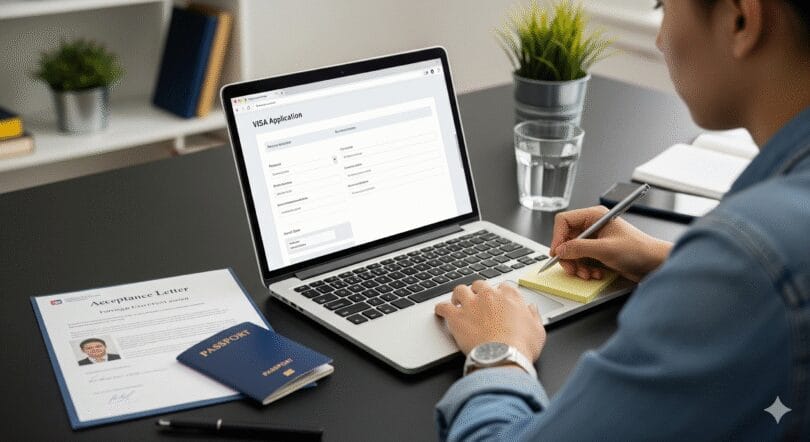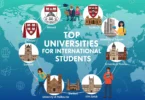How to Applying for Student Visa Abroad: Step-by-Step Guide
Introduction
Obtaining a student visa is one of the most critical steps in your study abroad journey. Without a visa, you cannot legally study or live in your chosen country. While each country has its own visa regulations, the process generally involves verifying admission to a recognized institution, proving financial stability, and submitting accurate documentation.
As an experienced study abroad consultant with 14 years of experience, I’ve helped thousands of students navigate complex visa processes successfully. In this guide, we’ll walk you through how to apply for a student visa abroad, highlight common mistakes to avoid, and provide actionable tips to improve your chances of approval.

Step-by-Step Guide to Applying for Student Visa Abroad
1. Understanding the Types of Student Visas
Different countries offer various visa categories depending on the program duration, level of study, and post-study work options. Some common types include:
- F-1 Visa (USA): For full-time academic programs, including undergraduate, graduate, and ESL courses.
- Tier 4 / Student Visa (UK): For degree programs, short courses, and vocational programs.
- Study Permit (Canada): For programs longer than six months.
- Student Visa (Australia): Covers bachelor’s, master’s, doctoral, and vocational courses.
- Student Visa (Germany): Usually covers long-term programs; EU Blue Card may follow post-graduation.
Consultant Tip: Carefully check the visa type applicable to your program and country. Misapplying can result in delays or denials.
2. Essential Eligibility Requirements
Visa eligibility varies by country, but some universal requirements include:
- Acceptance Letter: Proof of admission from a SEVP-certified or government-recognized institution.
- Financial Proof: Bank statements, scholarship letters, or sponsor affidavits to demonstrate sufficient funds.
- English Language Proficiency: TOEFL, IELTS, or equivalent scores if the program is in English.
- Academic Records: Previous transcripts, diplomas, and standardized test scores (SAT, GRE, GMAT).
- Passport Validity: Usually valid for at least six months beyond the study period.
- Health & Insurance: Some countries require medical examinations or proof of health coverage.
Expert Advice: Always prepare certified copies of all documents and keep both digital and hard copies.

Student visa application guide and tips for international students
3. Preparing Your Visa Documents
Document preparation is crucial and often the most time-consuming part of the process. A missing or incorrect document can lead to visa rejection. Here’s a checklist:
- Completed visa application form
- Passport-sized photographs according to specifications
- Admission letter or I-20/Confirmation of Enrollment
- Financial statements, including sponsor letters if applicable
- Academic transcripts and certificates
- English language test scores
- Statement of Purpose or motivation letter
- CV/Resume (for graduate programs)
- Health insurance documents (if required)
Consultant Tip: Organize your documents in the exact order requested by the embassy or consulate. Use a folder with tabs to make it easy for officials to review.
4. Scheduling the Visa Interview
Many countries require a visa interview at the embassy or consulate. Here’s how to prepare:
- Book Early: Interviews may have long waiting times; schedule months in advance.
- Practice Common Questions: Why you chose the country, your career plans, choice of university, and funding sources.
- Dress Professionally: First impressions matter; treat it like a formal job interview.
- Bring Originals: Always carry original documents along with copies.
Pro Tip: Confidence and clarity matter more than memorizing answers. Be honest, concise, and positive.

Student visa application guide and tips for students
5. Visa Fees and Processing Time
Visa fees vary by country and program type:
- USA F-1 Visa: ~$160
- UK Tier 4 Visa: £348
- Canada Study Permit: CAD 150
- Australia Student Visa: AUD 620
- Germany Student Visa: ~€75
Processing time ranges from 2 weeks to 3 months depending on the country and season. Always apply well in advance to avoid missing your program start date.
Consultant Advice: Keep a copy of the receipt and track your application online whenever possible.
6. Common Mistakes to Avoid
Based on my experience advising students, these errors often lead to delays or denials:
- Incomplete Forms: Ensure every field is accurately filled.
- Insufficient Financial Proof: Always show funds for tuition + living expenses.
- Late Application: Applying too close to program start dates can be risky.
- Misrepresentation: Providing false information is a serious violation.
- Ignoring Country-Specific Requirements: Some countries require bio-metric data or health checks.
Pro Tip: Double-check embassy websites for updates; visa rules can change frequently.
7. Tips for a Successful Student Visa Application
- Start preparing at least 8–12 months before your program begins.
- Maintain organized, complete documentation.
- Prepare a clear study plan or Statement of Purpose that explains why you chose the country and program.
- Highlight career intentions and tie them to your chosen course.
- Follow all instructions provided by the consulate or visa portal.
8. Post-Visa Approval Steps
Once your visa is approved:
- Check validity: Confirm your visa start and end dates.
- Book flights early: Ensure arrival in time for orientation.
- Arrange accommodation: Confirm dorms or off-campus housing.
- Prepare finances: Activate international banking and carry emergency funds.
- Understand local regulations: Learn about work permissions, healthcare, and emergency contacts.
Consultant Advice: Join student communities and forums for your destination; they offer valuable advice from current international students.
FAQs
Q1: Can I apply for a student visa on arrival?
Most countries require visa approval before arrival. Some exceptions exist in Asia and the Middle East.
Q2: What if my visa gets rejected?
Review the rejection reason, correct documents or procedures, and reapply. Some countries allow appeal or resubmission.
Q3: How early should I start preparing my visa?
At least 8–12 months before your program to manage documents, financial proofs, and potential delays.
Conclusion
Applying for a student visa abroad may seem complex, but with careful planning, thorough preparation, and expert guidance, it becomes manageable. Focus on accurate documentation, clear communication of your study intentions, and timely application to ensure a smooth visa process. Your study abroad journey starts with your visa, so treat it as the foundation of your global education adventure.









